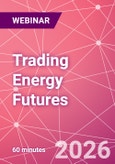Overview
This educational webinar will focus on how to improve trading performance while managing risk, with a special emphasis on the impact of current geopolitical events on price volatility.
Following the webinar, each registrant will receive a complimentary phone consultation with Stephen Schork to discuss topics specific to their business strategies.
The energy markets are complex and dynamic. As the industry’s premier provider of price-range forecasting and objective market analysis, the speaker applies deeply entrenched knowledge and experience to cut through the “noise” of data and synthesize it into succinct market views.
Businesses need to make important decisions. This webinar is a must for market participants to develop optimized trading and hedging strategies. The speaker continually monitors complex correlations between cost drivers and price action to provide clients with a game plan to navigate market volatility.
Presented by Stephen Schork, his forthright approach to benchmarking past projections against current market activity has established him as one of the industry’s most respected and sought-after energy experts.
Agenda
Part 1: Introduction
- Why trade energy futures and options?
- Utilizing commodity trading as a hedge against other sectors in the global economy
- Petroleum to products: history of crude oil prices relative to global demand
Part 2: Who’s Who?
- CFTC
- CME
- FCM
- Broker
- Market Participants
- Clearinghouse
Part 3: Developing a Trading Strategy
- Multi-disciplinary approach to analysis: quantitative, technical, and fundamental
- Using Schork Volatility Bands to identify buying/hedging opportunities
- Applying directional biases and support/resistance inflection points
- Calculating risk/reward rations before putting on a trade
- Position-sizing formulas based on near-term volatility measures to normalize risk parameters.
- Using hedges to manage price risk
- Rebalancing
Part 4: Trading Psychology
- Importance of discipline
- Conquering fear
- Learning from losses
Part 5: Relationships between cost drivers and price volatility
- OPEC’s changing role… geopolitics trumps economics.
- Who’s making/moving the market: the role speculators play and their influence on market dynamics.
Methodology
The analyst has developed a proprietary algorithm to calculate volatility. This mathematical formula is used as the basis to project data ranges for inconstant cost drivers. The models employ a probabilistic distribution expressed in volatility-based cones that expands beyond know data points and forecasts price ranges that represent support/resistance levels at varying confidence intervals.

LOADING...
Speakers

Mr Stephen Schork,
Founder and Editor ,
The Schork ReportStephen Schork is the Founder and Editor of The Schork Report, a daily subscription newsletter providing comprehensive technical and fundamental daily views of the energy cash and financial markets. Published since April 2005, The Schork Report is geared towards professionals in the global energy arena looking to improve economic performance while managing risk.
Schork was a floor trader (Local) in the New York Mercantile Exchange’s energy complex and has more than 18 years of experience in physical commodity and derivatives trading, risk systems modeling, and structured commodity finance.
A recognized expert in the energy sector, Schork is a regular guest on CNBC and Bloomberg Television. He is also frequently quoted in The Wall Street Journal, Business Week, Reuters, the Associated Press, Platts, The Street.com and CNNMoney.com.
Who Should Attend
- Energy Traders
- Energy Analysts
- Energy Buyers
- Energy Producers
- Airlines
- Delivery Services: FedEx/DHL, etc.
- Fleet Fuelers/Trucking & Transportation
- Oil Retailers
- Bankers
- Commercial and Industrial Users, e.g., universities and hospitals









